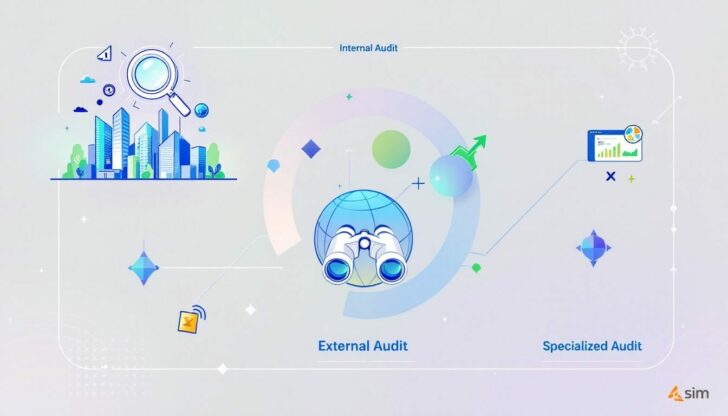An audit is a thorough examination of financial records to ensure accuracy and compliance. Whether you are a business owner, manager, or stakeholder, understanding the basics of audits is crucial. This guide will cover what an audit entails, different types of audits, their importance, and the overall process to prepare you for what lies ahead.
Table of Contents
Key Takeaways
Audits are critical for verifying financial accuracy and compliance, particularly for publicly traded companies and organizations receiving government funds.
Different types of audits, including external, internal, and IRS audits, serve distinct purposes and require varying degrees of preparation and compliance.
Effective audit preparation and management of challenges like resource allocation and operational efficiency are crucial for a smooth audit process and reduce stress on auditors.
What Is an Audit?

An audit is a formal examination of financial records, including an organization’s or individual’s accounts, conducted by professional accountants, either internally or by an external CPA firm. This inspection aims to ensure honesty and accuracy in financial positions, providing an unbiased review of accounts. Financial audits are particularly essential for publicly traded companies and organizations receiving government funding, as they must meet stringent legal requirements.
Audits can be conducted internally by employees within the organization or externally by certified public accountants (CPAs) from independent firms. The primary purpose of these audits is to ensure compliance by reviewing financial statements for accuracy and identifying any significant errors.
Financial audits help organizations stay transparent, fostering trust among stakeholders and mitigating potential risks.
Key Points of Auditing
The primary objective of an audit is to validate the accuracy of financial reporting and ensure compliance with relevant standards. This involves a thorough examination of financial records, ensuring that all financial statements are presented fairly and free from material misstatements. Auditing plays a crucial role in maintaining the integrity of financial information, which is vital for decision-making and regulatory compliance.
Audits also promote transparency and accountability within organizations. Audits enhance the accuracy and clarity of financial statements by identifying significant errors and suggesting improvements. This not only reassures stakeholders but also strengthens the internal controls of the organization, ultimately leading to better financial health and performance.
Different Types of Audits

Audits come in various forms, conducted by different parties such as external auditors, internal auditors, consultant auditors, and tax agencies like the IRS. An energy audit assesses and analyzes energy flows within a building or system to identify opportunities for energy conservation by reducing input without compromising output. Each type of audit serves a distinct purpose, whether it’s evaluating financial accounts, ensuring compliance, or verifying tax returns.
Understanding these different types can help you better prepare for and navigate the audit process.
External Audits by External Auditors
External audits are primarily conducted to identify material misstatements in financial statements, providing confidence to stakeholders that the financial records are presented fairly. An auditor’s opinion is crucial in this context as it provides assurance to users of financial statements regarding their fair presentation. These audits are carried out by external auditors who follow standards different from the hiring company, ensuring their independence and objectivity. This independence is crucial for maintaining the credibility of the audit report.
One significant regulation affecting external audits is the Sarbanes-Oxley Act (SOX), which requires publicly traded companies to have an evaluation of their internal controls. Established in 2002, the Public Company Accounting Oversight Board (PCAOB) oversees the audits of public companies to protect investors and the public interest by promoting informative, accurate, and independent audit reports.
Internal Audits
Internal audits are conducted by employees within the organization to assess compliance and effectiveness of the company’s policies and procedures. These audits focus on evaluating internal controls, financial records, and operational efficiency, ensuring that the organization’s processes are running smoothly and effectively.
The role of internal auditors is to provide independent assurance that the organization’s risk management, governance, and internal control processes are operating effectively. Internal audits maintain robust internal controls and enhance overall financial health by identifying areas of improvement and ensuring adherence to policies.
IRS Audits
IRS audits serve to verify the accuracy of taxpayers’ returns and specific transactions, ensuring that individuals and businesses are complying with tax laws. Individuals are selected for internal revenue service audits through random statistical formulas or connections to others with tax errors. These audits can be conducted by mail or through in-person interviews, depending on the complexity and nature of the issues.
Certain tax credits, deductions, or types of income may trigger an IRS audit. During an audit, the IRS may request specific documents related to tax return preparation, and taxpayers are notified by mail. Taxpayers have rights during the audit process, including the right to seek professional representation and to appeal the audit findings if they disagree.
The Audit Process
The audit process encompasses several key stages to ensure a thorough examination of financial records. Typically, this process involves planning and preparation, fieldwork and evidence collection, and reporting and follow-up. Each stage is critical in evaluating the accuracy of financial statements and the effectiveness of internal controls.
Planning and Preparation
During the planning phase, auditors hold a formal meeting with management to discuss the audit’s scope and objectives. This phase involves assessing relevant risks, identifying necessary financial documentation, and determining the extent and methods of the audit based on the organization’s activities. Auditors also create a preliminary survey to gather relevant information about the unit being audited.
The planning phase is crucial as it sets the groundwork for the entire audit process. By thoroughly understanding the organization’s operations and potential risks, auditors can develop an effective audit plan that ensures comprehensive coverage and efficient resource allocation.
Fieldwork, Evidence Collection, and Internal Controls
Fieldwork involves testing financial records and assessing whether identified controls are functioning as intended. This phase includes testing transactions, conducting interviews with personnel, and using various methods such as observation, inquiry, and analytical procedures to gather necessary evidence. Auditors examine financial records meticulously to validate the financial statements and assess the financial position.
However, manual evidence collection can be tedious and inefficient, as different teams may spend excessive time searching for the same documents during audits. Streamlining this process with technology can significantly enhance the efficiency and accuracy of audits.
Reporting and Follow-Up
The findings from the fieldwork phase are summarized into significant observations that will inform the audit report. Auditors draft a report that includes their observations, findings, and recommendations, along with a management response section for corrective actions, including the auditor’s opinion. This report is crucial for providing a comprehensive overview of the audit results.
After the audit report is submitted, a follow-up review may be conducted to assess whether the audited entity has implemented the recommendations. This ensures that the necessary corrective actions are taken to address any identified issues, enhancing the overall effectiveness of the audit process.
Importance of Financial Audits and Financial Statements
Financial audits are essential for verifying the accuracy of financial records and ensuring compliance with various regulations. External audits, in particular, are typically required by investors and lenders to confirm the reliability of a business’s financial data. This ensures that stakeholders have confidence in the financial statements presented by the organization.
Besides ensuring compliance, audits provide significant benefits such as enhancing transparency and credibility, fostering better relations with stakeholders, and assisting management in making more informed decisions. Regular audits help mitigate risks by verifying adherence to industry standards and contract obligations, ultimately contributing to the financial health and stability of the organization.
Preparing for an Audit

Preparing for an audit involves several practical steps to ensure a smooth and efficient process. One of the first steps is to request the list of documents needed from the auditor at least a month prior to the audit. Utilizing a digital data room to share necessary files and ensuring consistent naming conventions can streamline document management and retrieval.
Assigning responsibilities for reconciliations and supporting schedules to knowledgeable team members is crucial for efficient preparation. Setting up a shared calendar to track important deadlines and maintaining open communication across the organization helps prioritize audit requests and ensures everyone is informed of progress and potential delays.
Common Audit Challenges
Audits can uncover inefficiencies in a company’s operations, providing opportunities for improvement. However, many organizations face complexities when conducting multiple audits due to various frameworks, leading to duplicated efforts and resource allocation challenges. Collaborating with expert auditors can streamline the compliance process and overcome resource limitations.
Employing governance, risk, and compliance (GRC) technology can enhance the efficiency of evidence collection and improve overall audit management. Auditors often face high levels of stress, especially during busy seasons, which can lead to burnout if not managed properly. Effective stress management strategies and a balanced lifestyle are crucial for maintaining professional judgment and decision-making in the auditing field.
Rights and Responsibilities During an Audit
Individuals have rights that protect them from unreasonable demands and unfair actions during an audit. Auditees are entitled to reasonable time to gather and submit requested information, and they can challenge the findings of an audit if they disagree with the results. Ensuring transparency and accountability, individuals have the legal requirement to access relevant records during an audit.
Parties involved in an audit must provide necessary access to documentation and records as stipulated in the audit agreement. Taxpayers have the right to seek professional representation during the appeals process to enhance their chances of a favorable outcome. Audited entities are responsible for addressing any discrepancies found during the audit and implementing corrective actions.
How Long Does an Audit Take?
The duration of an audit can vary significantly depending on various factors, including the type of audit, its complexity, the availability of information, and the level of preparedness. For instance, correspondence audits are generally quicker than office or field audits. Complex tax issues, such as intricate financial transactions, can also prolong the audit duration.
Your cooperation and level of preparedness during the audit can either speed up or slow down the process. Additionally, the workload of the auditing agency, particularly during peak periods, can impact the timeline. Being well-prepared and maintaining open communication with auditors can help ensure a smoother and quicker audit process.
What Happens After an Audit?
After an audit, if you agree with the findings, you need to sign the examination report or a similar form. Possible outcomes of an IRS audit include owing additional taxes or entering a mediation or appeal process. Conducting a debriefing after the audit can help identify improvements for future preparations and enhance overall audit management.
If there is a disagreement with the audit findings and an appeal is filed, this can extend the resolution timeline significantly. Options include requesting a conference with an IRS manager, seeking mediation, or filing an appeal if you disagree with the audit findings. Being proactive and understanding your rights can help navigate the post-audit process more effectively.
Are Audits Beneficial or Stressful?
The audit process can induce stress among auditors due to high stakes and client expectations. However, achieving work-life balance is essential for auditors to maintain their professional effectiveness and personal well-being. Audits have a dual nature, providing necessary oversight while also causing anxiety for those involved.
Despite the stress, audits ensure compliance with regulations and enhance the accuracy of financial reporting. The benefits of audits, such as improved transparency, risk mitigation, and informed decision-making, outweigh the stress involved.
Understanding the audit process and being well-prepared can help manage the stress and maximize the benefits of audits.
Learn more, 4 Reasons You May Need a Financial Statement Audit.
Summary
Financial audits are an essential aspect of maintaining transparency, compliance, and accuracy in financial reporting. Understanding the different types of audits, the audit process, and how to prepare for them can help organizations and individuals navigate this complex but vital aspect of financial management. By ensuring robust internal controls and adhering to regulatory standards, audits play a crucial role in fostering trust and credibility in the financial world.
Frequently Asked Questions
What is the main purpose of a financial audit?
The main purpose of a financial audit is to ensure the accuracy and integrity of financial statements, thereby promoting transparency and adherence to applicable regulations.
What are the different types of audits?
The different types of audits include external audits, internal audits, and IRS audits, each designed to verify financial statements, assess internal controls, or ensure compliance with tax regulations. Understanding these distinctions is essential for effective financial management.
How long does an audit typically take?
An audit typically takes varying lengths of time depending on its type and complexity, with correspondence audits being quicker and field audits taking longer. Ultimately, preparedness significantly influences the duration of the audit process.
What should I do to prepare for an audit?
To effectively prepare for an audit, ensure you obtain the list of required documents in advance, utilize a digital data room for file sharing, assign clear responsibilities, and foster open communication within your organization. This proactive approach will streamline the audit process.
What happens if I disagree with the findings of an audit?
If you disagree with the audit findings, it is advisable to request a conference with an IRS manager, seek mediation, or file an appeal to challenge the results. Taking these steps can help address your concerns effectively.









